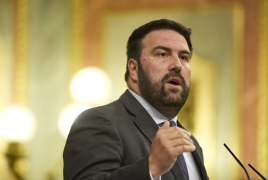Spanish MP says Turkey’s recognition of Armenian Genocide moral imperative April 28, 2025 - 13:48 AMT PanARMENIAN.Net - Spanish Parliament Member Jon Iñarritu emphasized that history demonstrates how the impunity and non-recognition of mass crimes increase the risk of their recurrence. According to the lawmaker, Turkey’s recognition of the Armenian Genocide is not only a matter of historical justice but also a moral imperative, reports Armenpress. Iñarritu highlighted that Turkey’s systematic denial is not only an insult to the victims’ memory but also perpetuates a culture of impunity. "Turkey has institutionalized denial as state policy, combining historical revisionism, diplomatic pressure, economic threats, and well-funded international disinformation campaigns. This approach undermines truth, distorts the present, and blocks any genuine path to reconciliation," the lawmaker noted. Addressing what steps the international community should take, Iñarritu stated that symbolic declarations and polite diplomacy must be surpassed. "The international community must adopt a firm and principled stance, aligned with international law and human rights. Recognizing the Armenian Genocide is not only about historical justice but also a moral imperative. Furthermore, comprehensive pressure must be exerted on Turkey to open its archives, accept responsibility, and move toward full and unequivocal recognition. Sustainable peace can only be built on truth," he stated. He also discussed the conditions under which Turkey might recognize the Armenian Genocide, stressing that such a step requires more than just political will. "Recognition would demand a profound cultural and identity transformation. In this regard, Germany’s confrontation with its past after the Holocaust serves as a powerful example: only by honestly facing history can a society achieve real democratic evolution. For Turkey, this means dismantling the fundamental nationalism built on denial. It requires Turkish civil society, especially the younger generations, to come to terms with the fact that over 1.5 million Armenians, as well as other Christian minorities such as Assyrians and Pontic Greeks, were systematically exterminated during the final days of the Ottoman Empire. This is not about reopening wounds but recognizing them to heal," he emphasized. Iñarritu added that the current political climate in Turkey, shaped by authoritarianism, political Islam, and neo-Ottoman narratives, makes short-term recognition of the Armenian Genocide unlikely. "Nevertheless, I hope that, over time, a different Turkey will emerge—one that is more democratic, pluralistic, and willing to confront its history without fear," he stressed. He also touched upon the ongoing normalization talks between Armenia and Turkey and the potential impact of the Armenian Genocide issue in that context. "The fact that Armenia and Turkey are engaged in dialogue is a welcome development, especially amid global polarization and diplomatic deadlocks. Any efforts aimed at mutual understanding, even if initially focused on pragmatic issues like opening borders or enhancing economic ties, should be encouraged. However, it is difficult to imagine the Genocide issue taking a prominent place on the agenda. Addressing this tragedy requires political maturity, ethical determination, and institutional courage—qualities regrettably absent in Turkey’s current leadership. Nonetheless, if the dialogue persists over time and is based on mutual respect and good faith, it could gradually create conditions for a sincere and constructive approach to the Armenian Genocide," Iñarritu said. He further stressed that when discussing the Armenian Genocide or similar crimes, the phrase "never again" must become a real commitment, not an empty slogan. "The Armenian case is symbolic: the fact that the Genocide has been denied for over a century has created a dangerous precedent. A truly developed humanity must invest in active remembrance, rigorous historical education, and transitional justice as the cornerstones of our ethical foundation. At the same time, clarity is essential: not every crime is genocide, and diluting the term undermines its meaning. However, when we speak of systematic, premeditated extermination based on ethnic or religious motives, as with the Armenians, there must be no justification or relativization. Naming such crimes is not only a duty to the past but a guarantee for the future," Iñarritu concluded. The foreign ministers of Armenia and Azerbaijan, Ararat Mirzoyan and Jeyhun Bayramov, have arrived in Washington. The CSTO budget for the current year requires adjustments due to the refusal of Yerevan to pay their share of contributions. Six total incidents have burned 19 old-growth trees. Friday night 8 trees were torched along the beautiful main entrance. The EU does not intend to conduct military exercises with Armenia, Lead Spokesperson for EU Foreign Affairs and Security Policy Peter Stano says. Partner news |